英语句子成分和英语句子结构
英语句子成分及结构

英语句子成分及结构英语句子由多个成分构成,其中主要的成分有:主语、谓语、宾语、定语、状语和补语。
1. 主语(Subject):句子中的主要主体或实施者。
例如:John is a teacher.(John是主语)2. 谓语(Predicate):句子中描述主语动作或状态的部分。
例如:John is teaching math.(is teaching math是谓语)3. 宾语(Object):句子中接受动作的对象。
例如:She reads books.(books是宾语)4. 定语(Adjective):句子中修饰名词或代词的部分。
例如:He is wearing a red shirt.(red修饰shirt)5. 状语(Adverb):句子中修饰动词、形容词、副词等的部分。
例如:She runs quickly.(quickly修饰runs)例如:He became a doctor.(a doctor是补语)英语句子的结构可以分为简单句、并列句、复合句等。
1. 简单句(Simple Sentence):由一个独立的主语和谓语构成的句子。
例如:She sings well.例如:He is tired, but he keeps working.例如:I will buy a new car when I save enough money.在复合句中,从句有三种类型:名词性从句、形容词性从句和副词性从句。
- 名词性从句(Noun Clause):在句子中担当名词的成分。
例如:What you said is true.(what you said是名词性从句)- 形容词性从句(Adjective Clause):在句子中作定语修饰名词或代词。
例如:The book that I'm reading is very interesting.(that I'm reading是形容词性从句)- 副词性从句(Adverbial Clause):在句子中作状语修饰动词、形容词或副词。
英语句子成分和英语句子结构讲解
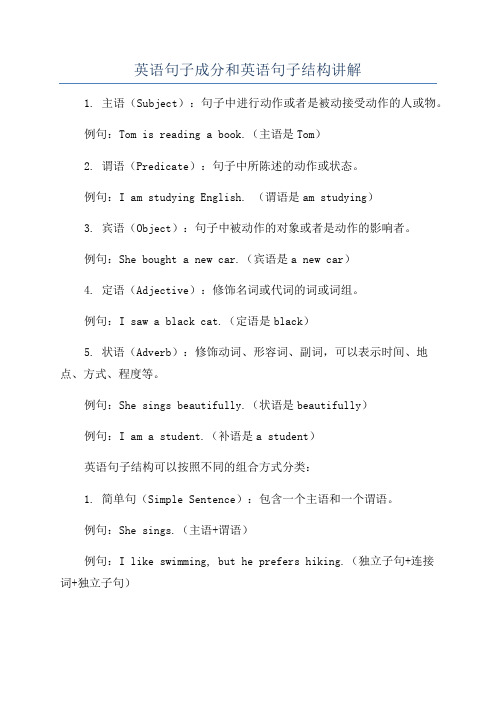
英语句子成分和英语句子结构讲解1. 主语(Subject):句子中进行动作或者是被动接受动作的人或物。
例句:Tom is reading a book.(主语是Tom)2. 谓语(Predicate):句子中所陈述的动作或状态。
例句:I am studying English. (谓语是am studying)3. 宾语(Object):句子中被动作的对象或者是动作的影响者。
例句:She bought a new car.(宾语是a new car)4. 定语(Adjective):修饰名词或代词的词或词组。
例句:I saw a black cat.(定语是black)5. 状语(Adverb):修饰动词、形容词、副词,可以表示时间、地点、方式、程度等。
例句:She sings beautifully.(状语是beautifully)例句:I am a student.(补语是a student)英语句子结构可以按照不同的组合方式分类:1. 简单句(Simple Sentence):包含一个主语和一个谓语。
例句:She sings.(主语+谓语)例句:I like swimming, but he prefers hiking.(独立子句+连接词+独立子句)3. 并列句(Coordinative Sentence):用连词连接两个或更多的相同层次的分句。
例句:I am tired, so I'm going to bed.(分句+连词+分句)例句:She invited me to a party, which made me happy.(主句+从句)总结起来,英语句子成分和结构的掌握对于理解和构建句子都是非常重要的。
通过对各个成分的认识和使用,可以更准确地表达自己的意思。
而了解不同的句子结构,可以帮助我们构建丰富多样的句子,提高语言表达的能力。
英语句子成分及结构

英语句子成分及句子结构英语句子基本构成成分:主语:可以作主语的成分有名词(如boy),主格代词(如I ,we, he, she, they ),数词、动词不定式,动名词等。
最常用的便是名词、代词、动名词、动词不定式。
主语一般在句首。
(1)名词作主语English is very important. 英语是很重要的。
The students all love their English teacher. ‘这些学生都爱他们的英语老师。
(2)代词作主语They go to school by bus. 他们乘公共汽车上学。
(3)动名词作主语Watching TV too much is bad for your eyes.看电视太多对你的眼睛是有害的。
It’s no use regretting it. 后悔是无用的。
(4)动词不定式(短语)作主语To see is to believe. 眼见为实。
It is necessary to master a foreign language.掌握一门外语是很必要的谓语:谓语由动词构成,谓语时态、语态的变化都体现在动词的变化上,一般在主语之后。
(1)及物动词作谓语We should help each other. 我们应该互相帮助。
All of the students like the novel. 所有这些学生都喜欢这本小说。
(2)不及物动词作谓语You’re driving too fast. 你开车开得太快了。
The teacher came in, book in hand. 老师走进教室,手里拿着书。
(3)连系动词作谓语He looks worried.他看起来很担心。
The box itself is not so heavy. 箱子本身并不重。
(4) 复合谓语:①由情态动词加动词原形构成。
如:You may keep the book for two weeks.②由助动词加动词原形,现在分词,过去分词构成。
英语句子成分和句子结构分析

英语句子成分和句子结构分析语法讲解1认识语法一、英语语法分为两大部分词法微观遣词;句法宏观造句01词法微观遣词1. 实词:有实际意义的词;名词n.:表事物名称动词vi./vt.:行为,动态;vi.不及物动词,本身可以表达完整意义,后面不需要带宾语vt.及物动词,本身无法表达完整意义,后面必须带宾语形容词adj.:修饰n.副词adv.:修饰v./adj.或者句子中其他adv或者整个句子代词Pron.:代替n.数词num.:表数量基数词,表顺序序数词2. 虚词:没有实际意义的词;介词prep.:说明词与词之间的关系连词conj.:说明句子与句子之间的关系冠词art.:在n.前,限定n.感叹词int.:表达感叹02句法宏观造句1.句子的成分2.句子结构3.句子的变化4.句子的功能5.句子的类型:简单句,并列句,复合句6.复合句:名词性从句,定语从句,状语从句二、语法四大原则1. 词性决定词用2. 同类同用同种类型的词,用法相同,越细分,越一致3. 动词即句魂句子里最重要的是谓语,谓语部分最重要的就是动词4. 举一反三由表及里,发掘句子结构,归属;认识句子本质,由点及面,放大到句群;语法精讲2句子的成分主体:主语,谓语,宾语,表语次体:定语,状语,补语,同位语主语:一个句子的主体,是全句述说的对象;常由名词,代词或相当于名词或代词的词担任,一般放在句首;The sun名词n. rises in the east.W e代词pron. are friendsT wenty years数词num. is a short time in history.S eeing动名词 is believingT o be a teacher不定式is my dreamW hat he needs 句子is a book 主语从句I t 形式主语is time to go home真正的主语形式主语是为保持句子平衡谓语:表示主语的行为或状态,常用动词或动词词组担任,放在主语的后面W e study实意动词 EnglishI can情态动词do itI don’t助动词knowH e is系动词asleep.宾语:表示谓语行为的对象,常由名词,代词或相当于名词的词担任,一般放在及物动词或者介词之后;I play with him代词I like china名词H ow many do you need ——we need two数词I enjoy working with you动名词I hope to see you again不定式D id you write down what he said句子U nder the snow介宾短语,there are many rocks.H e gave me间接宾语a book直接宾语 yesterday表语:用来说明主语的性质或状态,一般由名词或者形容词担任;凡是系动词be 动词,感官动词等出现的地方,后面必定带着表语He is a teacher名词Seventy-four you don’t look it代词F ive and five is ten数词H e is asleep形容词T his picture is on the wall介词短语M y watch is missing/lost 形容词化的分词T o wear a flower is to say“ I’m poor ,I can’t buy a ring”不定式T he question is whether they will come句子语法精讲3定语:用来修饰或者限制名词的成分,常用形容词或者相当于形容词的短语或者从句担任,形容词放在名词前面;相当于形容词的短语或者从句放在名词后面;H e is a clever boyT his is an apple treeT here are ten students in our classS he is Tom’s sisterH e bought some sleeping pillsT he girl in red is his sisterW e have a lot of work to doT he girl standing under the tree is his daughterD o you know the man who spoke just now.状语:用来说明动词,形容词,副词或者整个句子的成分;常由副词担任;修饰动词可放动词前,也可放在动词后;修饰形容词或者副词时放在他们前面;动词的八个状态:时间,地点,原因,状态,目的,结果,方式,程度T he students study hardI often write to himH e wrote with a red pencilH e went to see a filmT he students went away laughingI’ll write to you as soon as I get there .补语:表示补充说明,总是跟着宾语跑I found a book lying on the floor.D o you smell something burningS he asked me to go with her.独立成分:同位语,感叹语B ruce,my English teacher,is a cool man That’s great语法精讲4简单句的5种基本结构通过一个爱情故事掌握5种简单句;1, 主语+谓语:She comes.2, 主语+系动词+表语She is lovely.3, 主语+谓语+宾语I love her.4, 主语+谓语+间宾+直宾I gave her a rose.5, 主语+谓语+宾语+宾补I made her happy. 2三大句子结构类型1, 简单句F rank and Eric are good friends.I make and have breakfast.2, 并列句I like English, but I don’t like math.I hate grammar,while he loves it.3, 复合句W hat she does is not good.T he man who has an umbrella in his hand is my uncle.W hen you finish the work,you may go out to play with Sam.语法精讲5简单句T hat is what I want to tell you. 表语从句I t’s a question how he did it. 同位语从句T he man whom you talk with is my friend. 定语从句I f I am free,I will go shopping . 条件状语从句四种句子类型:01陈述句肯定,否定H e is six years old.S he doesn’t like English.02疑问句一般,特殊,选择,反义D o you like swimming ↑一般疑问句W hat are you doing ↓特殊疑问代词+一般疑问句=特殊疑问句I s this a pen ↑or a pencil ↓选择疑问句S he likes dancing↓,doesn’t she ↑反义疑问句;前肯后否或者前否后肯03祈使句:命令,要求,请求;一般会略去主语,动词开头B e careful , boysD on’t speak in class04感叹句:how/what 开头H ow clever the boy isW hat a nice day it is。
英语语法之句子成分及句子结构

【语法体系】1.词法冠词、名词、代词、副词、动词、介词和介词短语、连词、数词。
2.句法句子成分:主语、谓语、宾语、表语、定语、状语、补足语等。
句子种类:陈述句、疑问句、祈使句、感叹句句子结构:简单句并列句a)名词性从句:主语从句、表语从句、宾语从句、同位语从句复合句:b)定语从句c)状语从句特殊句式:倒装句、强调句、省略句、there be句式主谓一致直接引语和间接引语虚拟语气【句子成分】1.主语:主语是一个句子的主体,一般位于句首。
名词(短语)、代词、数词、不定式(短语)、动名词(短语)、从句等均可作主语。
e.g. Instead,a picture should try to show the “life” of itssubject.e.g. To find a best friend is difficult.2.谓语:用来描述主语的行为动作或所处的状态,一般位于主语之后,由动词或动词短语充当,且谓语有人称、数、时态和语态等的变化。
e.g. I run into the classroom.e.g. He had an apple for breakfast.3.宾语:宾语是动作的承受者,一般位于及物动词之后。
名词(短语)、代词、数词、名词化的形容词、名词化的分次、不定式(短语)、动名词(短语)、从句等均可充当宾语成分。
e.g. People love to get together.e.g. I like chatting online.宾语的种类:(1)双宾语:间接宾语+直接宾语e.g. Hand me your book, please.(2)复合宾语:宾语+宾语补足语e.g. They elected him their monitor. 4.表语:表语用来说明主语的特征、类属、状态、身份等。
一般位于系动词之后,与之构成系表结构。
名词(短语)、代词、数词、形容词、副词、介词短语、不定式(短语)、动名词(短语)、分词、从句等均可作表语。
英语句子成分和句型结构
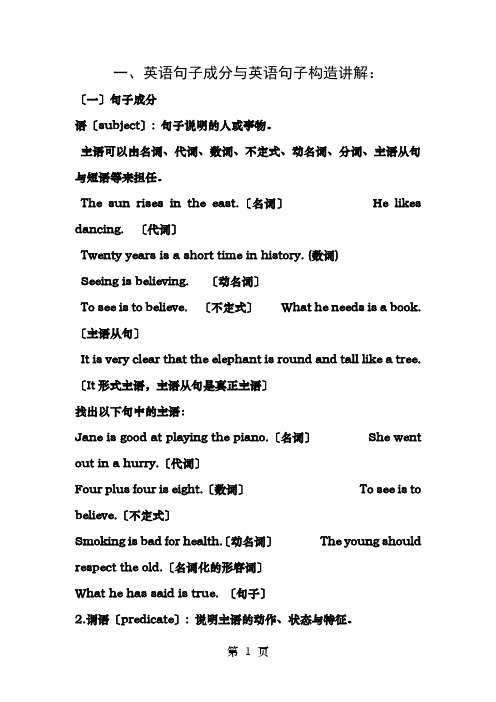
一、英语句子成分与英语句子构造讲解:〔一〕句子成分语〔subject〕: 句子说明的人或事物。
主语可以由名词、代词、数词、不定式、动名词、分词、主语从句与短语等来担任。
The sun rises in the east.〔名词〕He likes dancing. 〔代词〕Twenty years is a short time in history. (数词)Seeing is believing. 〔动名词〕To see is to believe. 〔不定式〕What he needs is a book. 〔主语从句〕It is very clear that the elephant is round and tall like a tree. 〔It形式主语,主语从句是真正主语〕找出以下句中的主语:Jane is good at playing the piano.〔名词〕She went out in a hurry.〔代词〕Four plus four is eight.〔数词〕To see is to believe.〔不定式〕Smoking is bad for health.〔动名词〕The young should respect the old.〔名词化的形容词〕What he has said is true. 〔句子〕2.谓语〔predicate〕: 说明主语的动作、状态与特征。
简单谓语:由动词或动词词组组成I saw the flag on the top of the hillHe looked after two orphans.复合谓语:由情态动词或助动词+动词;He can speak English well.She doesn’t seem to like dancing.找出以下句中的谓语〔注:只有动词才可作谓语。
〕:1. We love China.2. We have finished reading this book.3. He can speak English.4. She seems tired.语〔predicative〕: 系动词之后的成分,表示主语的性质、状态与特征。
英语句子成分及结构
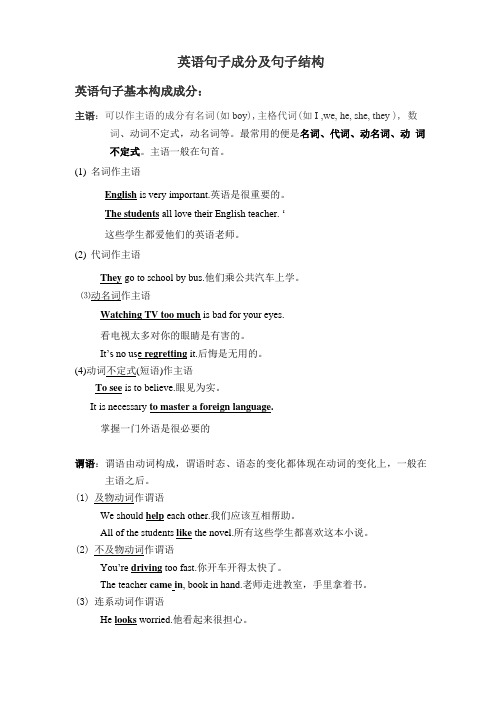
英语句子成分及句子结构英语句子基本构成成分:主语:可以作主语的成分有名词(如boy),主格代词(如I ,we, he, she, they ), 数词、动词不定式,动名词等。
最常用的便是名词、代词、动名词、动词不定式。
主语一般在句首。
(1)名词作主语English is very important.英语是很重要的。
The students all love their English teacher. ‘这些学生都爱他们的英语老师。
(2)代词作主语They go to school by bus.他们乘公共汽车上学。
⑶动名词作主语Watching TV too much is bad for your eyes.看电视太多对你的眼睛是有害的。
It’s no us e regretting it.后悔是无用的。
(4)动词不定式(短语)作主语To see is to believe.眼见为实。
It is necessary to master a foreign language.掌握一门外语是很必要的谓语:谓语由动词构成,谓语时态、语态的变化都体现在动词的变化上,一般在主语之后。
(1)及物动词作谓语We should help each other.我们应该互相帮助。
All of the students like the novel.所有这些学生都喜欢这本小说。
(2)不及物动词作谓语You’re driving too fast.你开车开得太快了。
The teacher came in, book in hand.老师走进教室,手里拿着书。
(3)连系动词作谓语He looks worried.他看起来很担心。
The box itself is_not so heavy.箱子本身并不重。
(4)复合谓语:①由情态动词加动词原形构成。
如:You may keep the book for two weeks.②由助动词加动词原形,现在分词,过去分词构成。
英语句子成分和英语句子结构
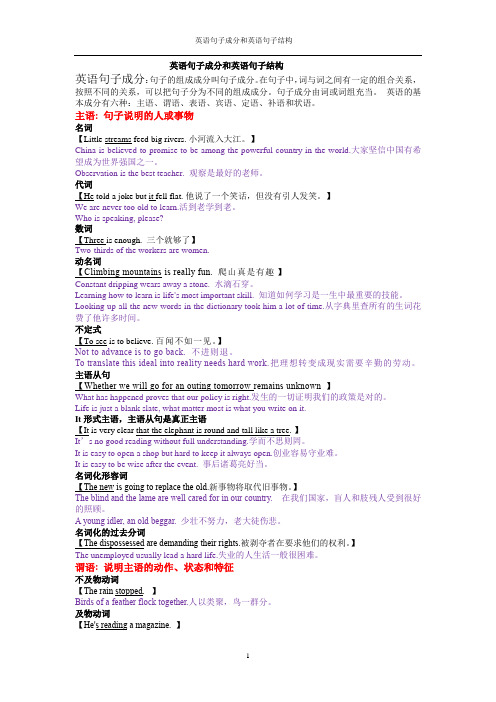
英语句子成分和英语句子结构英语句子成分:句子的组成成分叫句子成分。
在句子中,词与词之间有一定的组合关系,按照不同的关系,可以把句子分为不同的组成成分。
句子成分由词或词组充当。
英语的基本成分有六种:主语、谓语、表语、宾语、定语、补语和状语。
主语: 句子说明的人或事物名词【Little streams feed big rivers. 小河流入大江。
】China is believed to promise to be among the powerful country in the world.大家坚信中国有希望成为世界强国之一。
Observation is the best teacher. 观察是最好的老师。
代词【He told a joke but it fell flat. 他说了一个笑话,但没有引人发笑。
】We are never too old to learn.活到老学到老。
Who is speaking, please?数词【Three is enough. 三个就够了】Two-thirds of the workers are women.动名词【Climbing mountains is really fun. 爬山真是有趣】Constant dripping wears away a stone. 水滴石穿。
Learning how to learn is life's most important skill. 知道如何学习是一生中最重要的技能。
Looking up all the new words in the dictionary took him a lot of time.从字典里查所有的生词花费了他许多时间。
不定式【To see is to believe. 百闻不如一见。
】Not to advance is to go back. 不进则退。
To translate this ideal into reality needs hard work.把理想转变成现实需要辛勤的劳动。
英语句子成分及结构

英语句子成分及结构 Prepared on 22 November 2020英语句子成分及句子结构英语句子基本构成成分:主语:可以作主语的成分有名词(如boy),主格代词(如I ,we, he, she, they ),数词、,等。
最常用的便是名词、代词、动名词、动词不定式。
主语一般在句首。
(1)名词作主语English is very important. 英语是很重要的。
The students all love their English teacher. ‘这些学生都爱他们的英语老师。
(2)代词作主语They go to school by bus. 他们乘公共汽车上学。
(3)作主语Watching TV too much is bad for your eyes.看电视太多对你的眼睛是有害的。
It’s no use regretting it. 后悔是无用的。
(4)动词(短语)作主语To see is to believe. 眼见为实。
It is necessary to master a foreign language.掌握一门外语是很必要的谓语:谓语由动词构成,谓语、语态的变化都体现在动词的变化上,一般在主语之后。
(1)作谓语We should help each other. 我们应该互相帮助。
All of the students like the novel. 所有这些学生都喜欢这本小说。
(2)作谓语You’re driving too fast. 你开车开得太快了。
The teacher came in, book in hand. 老师走进教室,手里拿着书。
(3)连系动词作谓语He looks worried.他看起来很担心。
The box itself is not so heavy. 箱子本身并不重。
(4) 复合谓语:①由情态动词加动词原形构成。
如:You may keep the book for two weeks.②由助动词加动词原形,现在分词,过去分词构成。
英语句子成分及句子结构
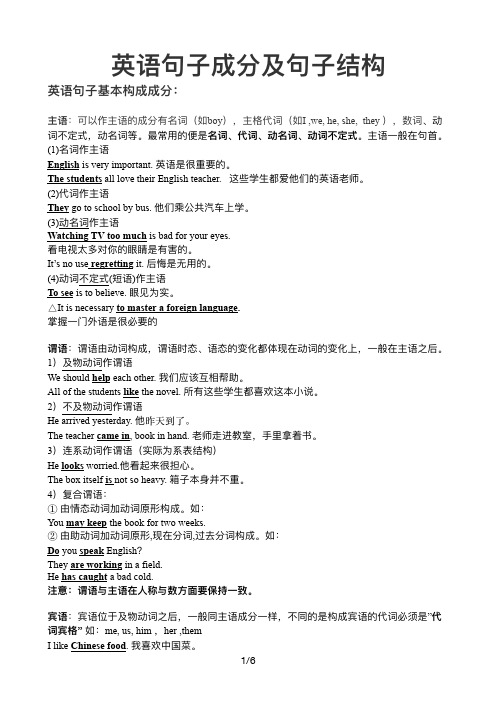
英语句⼦成分及句⼦结构英语句⼦基本构成成分:主语:可以作主语的成分有名词(如boy),主格代词(如I ,we, he, she, they ),数词、动词不定式,动名词等。
最常⽤的便是名词、代词、动名词、动词不定式。
主语⼀般在句⾸。
(1)名词作主语English is very important. 英语是很重要的。
The students all love their English teacher. 这些学⽣都爱他们的英语⽼师。
(2)代词作主语They go to school by bus. 他们乘公共汽⻋上学。
(3)动名词作主语Watching TV too much is bad for your eyes.看电视太多对你的眼睛是有害的。
It’s no use regretting it. 后悔是⽆⽤的。
(4)动词不定式(短语)作主语To see is to believe. 眼⻅为实。
△It is necessary to master a foreign language.掌握⼀⻔外语是很必要的谓语:谓语由动词构成,谓语时态、语态的变化都体现在动词的变化上,⼀般在主语之后。
1)及物动词作谓语We should help each other. 我们应该互相帮助。
All of the students like the novel. 所有这些学⽣都喜欢这本⼩说。
2)不及物动词作谓语He arrived yesterday. 他昨天到了。
The teacher came in, book in hand. ⽼师⾛进教室,⼿⾥拿着书。
3)连系动词作谓语(实际为系表结构)He looks worried.他看起来很担⼼。
The box itself is not so heavy. 箱⼦本身并不重。
4)复合谓语:①由情态动词加动词原形构成。
如:You may keep the book for two weeks.②由助动词加动词原形,现在分词,过去分词构成。
英语句子结构和句子成分

一般疑问句
特殊疑问句
选择疑问句
反意疑问句
一般疑问句
①用来询问一件事,答案通常是yes或no,注意语序。 —Do you often speak English at school ? —Yes, I do. /No, I don’t.
②否定式的一般疑问句。此类一般疑问句表示反问或惊讶,通常用be动词、 情态动词或助动词后加not的缩写形式构成,放在句首。
③一用般疑ye问s, 句no也之可外用的其词他回表答示的肯一定点般或击疑否此问定处句的。词回答,如:certainly, sure, of course, I think so, all r输igh入t,文wi本th信p息leasure, perhaps 等代替yes, certainly not, not at all, never, I’m sorry, not yet, I’m afraid not 等代替no. 如: —Would you mind my joining your talk/discussion? —Of course not.
带有宾语补足语的一般句型为:某些及物动词(如make等+宾语 +宾补)。
宾补可由名词、形容词、副词、不定式、分词、介词短语和从句充当。
You mustn’t force him to lend his m输o入n标e题y文t本o信y息ou.(不定式短语)
We
saw
her
entering
the
room.(现在分词) 标题数字等都可以通过点击和重新 输入进行更改。文字数字大小颜色
We found everything in the lab in g参o考o此模d板order.(介词短语)
英语句子成分及结构
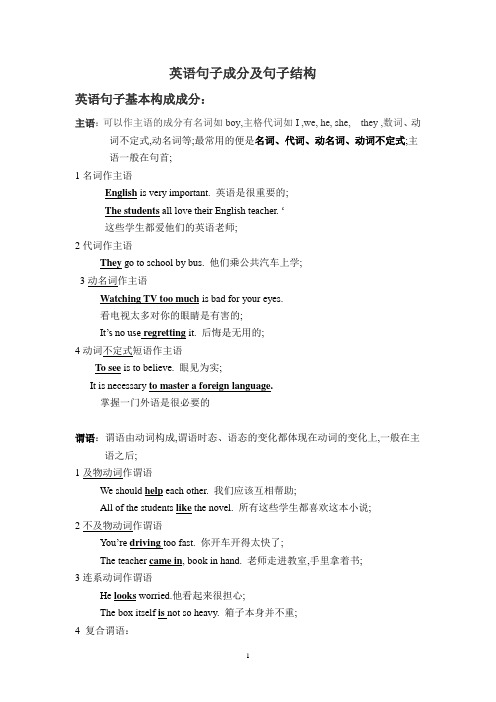
英语句子成分及句子结构英语句子基本构成成分:主语:可以作主语的成分有名词如boy,主格代词如I ,we, he, she, they ,数词、动词不定式,动名词等;最常用的便是名词、代词、动名词、动词不定式;主语一般在句首;1名词作主语English is very important. 英语是很重要的;The students all love their English teacher. ‘这些学生都爱他们的英语老师;2代词作主语They go to school by bus. 他们乘公共汽车上学;3动名词作主语Watching TV too much is bad for your eyes.看电视太多对你的眼睛是有害的;It’s no use regretting it. 后悔是无用的;4动词不定式短语作主语To see is to believe. 眼见为实;It is necessary to master a foreign language.掌握一门外语是很必要的谓语:谓语由动词构成,谓语时态、语态的变化都体现在动词的变化上,一般在主语之后;1及物动词作谓语We should help each other. 我们应该互相帮助;All of the students like the novel. 所有这些学生都喜欢这本小说;2不及物动词作谓语You’re driving too fast. 你开车开得太快了;The teacher came in, book in hand. 老师走进教室,手里拿着书;3连系动词作谓语He looks worried.他看起来很担心;The box itself is not so heavy. 箱子本身并不重;4 复合谓语:①由情态动词加动词原形构成;如:You may keep the book for two weeks.②由助动词加动词原形,现在分词,过去分词构成;如:Do you speak EnglishThey are working in a field.He has caught a bad cold.注意:谓语与主语在人称与数方面要保持一致;宾语:宾语位于及物动词之后,一般同主语成分一样,不同的是构成宾语的代词必须是”代词宾格”如:me, us, him ,her ,themI like Chinese food. 我喜欢中国菜;I saw him yesterday. 代词昨天我看到他了;I enjoyed talking to you.我和你谈话很高兴;He wanted to have a cup of tea. 不定式短语他想要一杯茶;We hoped that you would stay for a few days.我们希望你能多待几天的;直接宾语和间接宾语——有些及物动词可以有两个宾语,一个指人,一个指物,指人的叫作间接宾语,指物的叫直接宾语;合称双宾;例如:He gave me some ink . 他给了我一些墨水;间接宾语直接宾语Our teacher told us an interesting story. 老师给我们讲了一个有趣的故事;间接宾语直接宾语表语:与连系动词连用,构成系表结构,说明主语的身份或特征,一般由形容词、名词、动名词、动词不定式、分词等充当;如:The flower is beautiful.They are brother and sister. 他们是兄妹;Her father is sixty-five. 她父亲65岁;The poor boy was myself.那个可怜的孩子就是我自己;All you need do is to take a taxi from the airport.你只需从机场打个的即可;My favourite sport is swimming. 我最喜爱的运动是游泳;定语:定语为句子的次要成分,起修饰限制名词或代词的作用,可分为前置定语和后置定语;一般由形容词性物主代词、数词、形容词、副词、介词短语、动词不定式、分词短语或句子充当;2 Mr. Green has two sons. 格林先生有两个儿子;数词3 The girl under the tree is Kate. 在树下的那个女孩是凯特;介词短语4 I bought a new dictionary. 我买了本新字典;5This is a green cup.这是一个绿色的杯子;形容词6The people here are very friendly.副词这里的人们非常友好;7 Would you like something to drink 你想要些喝的东西吗不定式8 A barking dog seldom bites. 吠狗很少咬人;V-ing9The suggestion sent to the committee was adopted. 过去分词送往委员会的建议被采纳了;10 Do you know the man who is standing next to Mr. Green 定从你认识站在格林先生旁边的那个人吗状语:状语修饰动词、形容词、副词或全句,说明时间、地点、方式、原因、条件、让步、方向、程度、目的等;状语在句子中的位置很灵活,常见情况为:通常在句子基本结构之后,强调时放在句首;修饰形容词或副词时,通常位于被修饰的词之前;地点状语一般须在时间状语之前;一些表示不确定时间如:often或程度如:almost的副词状语通常位于be动词、助动词、情态动词之后,动词之前;1 时间状语I often get up at 5:30 in the morning. 我常常在早上5:30起床;Hearing the news, they felt very excited.听到这个消息,他们感到很兴奋;2 地点状语Pandas only live in China. 熊猫仅生活在中国;3 程度状语4 目的状语We’ll go to the b each for a picnic this Sunday.这个星期天我们将去沙滩野炊;He took some change from his pocket to buy a newspaper.他从口袋里掏出一些零钱来买报纸;She got up early so that she could catch the first bus.她早早地起床,以便能够赶上这辆早班车;5 方式状语We usually go to school on foot. 我们通常步行去上学;Please do it as I told you. 请按我告诉你的去做;6 让步状语Though she has a lot of money, she is unhappy.虽然她很有钱,而她并不幸福;No matter what happens, I will never lose heart.无论发生什么,我将决不失去信心;7 条件状语If you don’t work hard, you’ll fall be hind the others.假如你不努力学习,你将落后于别人;Given more attention, the flowers would have grown better.如果给予更多的关心的话,这些花将长得更好;8 原因状语We didn’t go to the park because of the bad weather.由于天气不好,我们没有去公园;Because he was ill, he didn’t go to school.由于病了,他没有去上学;9 结果状语The wind was so strong that we could hardly move forward.风是如此地猛烈,以致于我们寸步难行;He left early, so that he caught the train.他早早地离去,结果因此赶上了火车;10 伴随状语The doctor hurried off, with a medicine box under his arm.这位医生匆匆离去,胳膊下夹着一个药箱子;The teacher came into the classroom, followed by a group of his students. 老师进到教室里来,后面跟着一群学生;补语:补语是起补充说明作用的成份;最常见的是宾语补足语;名词、动名词、形容词、副词、不定式、现在分词、过去分词都可以在句子中作宾补;1We call her Xiao L i. 名词宾语宾语补足语2You must keep the room clean and tidy. 形容词宾语宾语补足语3John asked me to help him with his Chinese. 动词不定式宾语宾语补足语4I will have my hair cut tomorrow. 过去分词宾语宾语补足语5We saw the boy playing basketball on the playground just n ow. v-ing宾语宾语补足语6 Rain makes plants grow.雨水使植物生长;动词原形宾语宾补注意: 后跟名词作宾语补足语的动词有call, name, think, make, choose 等,后跟形容词作宾语补足语的谓语动词有keep, find, get, think, make 等;动词不定式作宾语补足语时,当谓语动词为感官动词如feel, see, hear, notice, watch, observe, sound, 等,使役动词如let, have, make 等,动词不定式不带to;英语中的五种基本句型结构一、句型1:Subject 主语+Verb 谓语可以直接接宾语;常见的动词如:work, sing, swim, fish, jump,arrive, come, die, disappear, cry, happen等;5 The sun was shining. 太阳在照耀着;二、句型2:Subject 主语+Link. V系动词+Predicate表语这种句型主要用来表示主语的身份、特点等;其系动词一般可分为下列两类:1表示状态;这样的词有:be, lo ok, seem, smell, taste, sound, keep等;如:1 This kind of food tastes delicious.这种食物吃起来很可口;2 He looked worried just now.刚才他看上去有些焦急;春天到了,天气变得越来越暖和;2 The tree has grown much taller than before.这棵树比以前长得高多了;三、句型3:Subject主语+Verb 谓语+Object 宾语充当;例:当我遇到困难时,李雷总能给我帮助;她打算在即将到来的“五一”外出旅游;她喜欢看电视;我不知道下一步该干什么;注意:英语中的许多动词既是及物动词,又是不及物动词;四、句型4:Subject主语+Verb谓语+Indirect object间接宾语+Directobject 直接宾语这种句型中,直接宾语为主要宾语,表示动作是对谁做的或为谁做的,在句中不可或缺,常常由表示“物”的名词来充当;间接宾语也被称之为第二宾语,去掉之后,对整个句子的影响不大,多由指“人”的名词或代词承担;引导这类双宾语的常见动词有:buy, pass, lend, give, tell, teach, show, bring, send等;一本词典作为生日礼物;heroes in the Long March.老人经常给孩子们讲述长征途中那些英雄的故事;3Sandy gave the dog some food.桑迪给狗喂了些食物;上述句子还可以表达为:1Her father bought a dictionary for her as a birthday present.3Sandy gave some food to the dog.五、句型5:Subject主语+Verb 动词+Object 宾语+Complement补语此句型的句子的共同特点是:动词虽然是及物动词,但是只跟一个宾语还不能表达完整的意思,必须加上一个补充成分来补足宾语,才能使意思完整;宾语补足语:位于宾语之后对宾语作出说明的成分;宾语与其补足语有逻辑上的主谓关系,它们一起构成复合宾语;宾语补足语的主要作用或者是补充、说明宾语的特点、身份等;或者表示让宾语去完成的动作等;担任补语的常常是名词、形容词、副词、介词短语、分词、动词不定式等;如:1You should keep the room clean and tidy. 形容词你应该让屋子保持干净整洁;2 They painted the door green. 形容词他们把门漆成绿色;4 What makes him think so 动词原形他怎么会这样想他父亲告诉他不要在街上玩;7 I saw a cat running across the road. 现在分词我看见一只猫跑过了马路.昨天我跟两个美国人合了张影;形容词;It充当形式宾语,to learn English是真正的宾语;我发现学英语很难;简单句五种基本句型巧记歌诀:英语句子万万千,五大句型把线牵;句型种类看动词,后接成分是关键;系词之后接表语,不及物后无需连;及物又可分三类,单宾双宾最常见;还有宾语补足语,各种搭配记心间;Exercises:指出下列句子中划线部分的成分;1.We all study hard at English.A. 主语B. 谓语C. 宾语D.表语2.Betty likes her new bike very much.A. 主语B.谓语C.宾语D.表语3.My brother is a policeman.A. 主语B.谓语C.宾语D.表语4.Were you at home last nightA.定语B.状语C.宾补D.表语5.Winter is the coldest season of the year.A 定语 B.状语 C.宾补 D.表语6.He often walks in the park.A.定语B.状语C.宾语D.表语7.Mary asked me to help her yesterday.A.定语B.状语C.宾补D.表语8.He bought me a nice present last week.A.宾语B.直接宾语C.间接宾语D.宾补9.His parents are doctors.A.宾语B.表语C.谓语D.定语10.I’ll get you some tea now.A.宾语B.直接宾语C.间接宾语D.宾补11.My mother told us an interesting story last night.A.表语B.直接宾语C.间接宾语D.宾补12.He has read the book twice.A.主语B.谓语C.表语D.宾语13.They seemed unhappy when they heard the news.A.表语B.谓语C.宾语D.定语14.Do you have something to eatA.状语B.定语C.宾语D.宾补15.We made him our monitor.A.宾语B.定语C. 状语D.宾补Exercises:指出下列句子的基本类型1.They are listening.2.My mother is fifty now.3.I have bought three books.4.My friend gave me a birthday present.5.I painted the wall white.6.The boss often makes the workers work twelve hours a day.7.They arrived at six o’clock.8.The map is on the wall9.Children often sing this song.10.Mr Wu teaches us English.11.She showed her friends all her pictures.12.I find him a lovely boy.请朗读以下句子,划分下列句子的成分,并指出他们分别属于简单句中的哪种;1. Our country consumes a large number of plastic bags.2. The super-thin bags are the main source of white pollution.3. We should encourage people to return to carrying cloth bags.4. The new rule came out.5. Enviornmental groups welcome the new rule.6. They can stop using plastic bags.7. What is particularly positive is that it involves public participation.8. Shops don’t offer free plastic bags to their consumers.9. Hong Kong and Australia are considering measures to curb plastic bag litter.10. Chinese consumers have gotten used to free plastic shopping bags.。
英语句子成分及结构
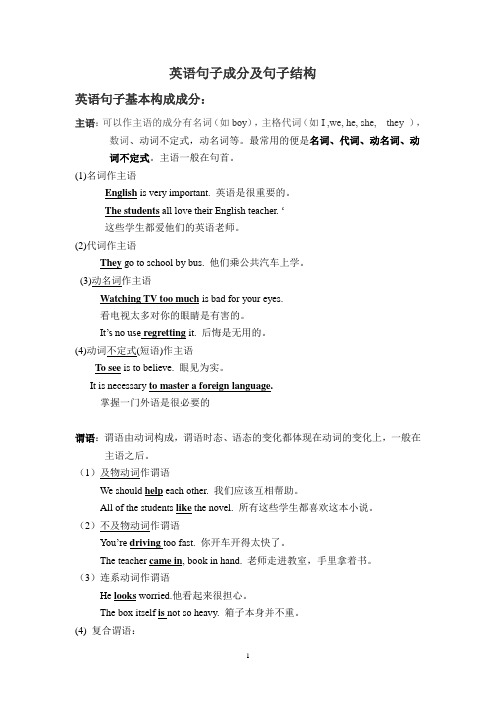
英语句子成分及句子结构英语句子基本构成成分:主语:可以作主语的成分有名词(如boy),主格代词(如I ,we, he, she, they ),数词、动词不定式,动名词等。
最常用的便是名词、代词、动名词、动词不定式。
主语一般在句首。
(1)名词作主语English is very important. 英语是很重要的。
The students all love their English teacher. ‘这些学生都爱他们的英语老师。
(2)代词作主语They go to school by bus. 他们乘公共汽车上学。
(3)动名词作主语Watching TV too much is bad for your eyes.看电视太多对你的眼睛是有害的。
It’s no use regretting it. 后悔是无用的。
(4)动词不定式(短语)作主语To see is to believe. 眼见为实。
It is necessary to master a foreign language.掌握一门外语是很必要的谓语:谓语由动词构成,谓语时态、语态的变化都体现在动词的变化上,一般在主语之后。
(1)及物动词作谓语We should help each other. 我们应该互相帮助。
All of the students like the novel. 所有这些学生都喜欢这本小说。
(2)不及物动词作谓语You’re driving too fast. 你开车开得太快了。
The teacher came in, book in hand. 老师走进教室,手里拿着书。
(3)连系动词作谓语He looks worried.他看起来很担心。
The box itself is not so heavy. 箱子本身并不重。
(4) 复合谓语:①由情态动词加动词原形构成。
如:You may keep the book for two weeks.②由助动词加动词原形,现在分词,过去分词构成。
英语句子成分及结构

英语句子成分及句子结构英语句子基本构成成分:主语:可以作主语的成分有名词(如boy),主格代词(如I ,we, he, she, they ),数词、动词不定式,动名词等。
最常用的便是名词、代词、动名词、动词不定式。
主语一般在句首。
(1)名词作主语English is very important. 英语是很重要的。
The students all love their English teacher. ‘这些学生都爱他们的英语老师。
(2)代词作主语They go to school by bus. 他们乘公共汽车上学。
(3)动名词作主语Watching TV too much is bad for your eyes.看电视太多对你的眼睛是有害的。
It’s no use regretting it. 后悔是无用的。
(4)动词不定式(短语)作主语To see is to believe. 眼见为实。
It is necessary to master a foreign language.掌握一门外语是很必要的谓语:谓语由动词构成,谓语时态、语态的变化都体现在动词的变化上,一般在主语之后。
(1)及物动词作谓语We should help each other. 我们应该互相帮助。
All of the students like the novel. 所有这些学生都喜欢这本小说。
(2)不及物动词作谓语You’re driving too fast. 你开车开得太快了。
The teacher came in, book in hand. 老师走进教室,手里拿着书。
(3)连系动词作谓语He looks worried.他看起来很担心。
The box itself is not so heavy. 箱子本身并不重。
(4) 复合谓语:①由情态动词加动词原形构成。
如:You may keep the book for two weeks.②由助动词加动词原形,现在分词,过去分词构成。
英语句子成分和英语句子结构讲解

、英语句子成分和英语句子结构讲解:(一)句子成分1. 主语(subject ):句子说明的人或事物。
主语可以由名词、代词、数词、不定式、动名词、分词、主语从句和短语等来担任。
The sun rises in the east. (名词)He likes dancing. (代词)Twenty years is a short time in history.(数词)Seeing is believing. (动名词)To see is to believe. (不定式)What he needs is a book. (主语从句)It is very clear that the elephant is round and tall like a tree.(It形式主语,主语从句是真正主语)找岀下列句中的主语:Jane is good at playing the piano. (名词)She went out in a hurry. (代词)Four plus four is eight. (数词)To see is to believe. (不定式)Smoking is bad for health. (动名词)The young should respect the old. (名词化的形容词)What he has said is true. (句子)2.谓语(predicate ): 说明主语的动作、状态和特征。
简单谓语:由动词或动词词组组成I saw the flag on the top of the hill?He looked after two orpha ns.复合谓语:由情态动词或助动词+动词;He can speak English well.She doesn ' t seem to like dancing.找岀下列句中的谓语(注:只有动词才可作谓语。
):1. We love Chi na.2. We have finished reading this book.3. He can speak English.4. She seems tired.3. 表语(predicative ):系动词之后的成分,表示主语的性质、状态和特征3 )双宾语 物.间宾(指人)和直宾(指物)宾语分为直接宾语和间接宾语 .直接宾语指物或事,间接宾语指人或动找岀下列句中的表语。
英语句子成分及句子结构
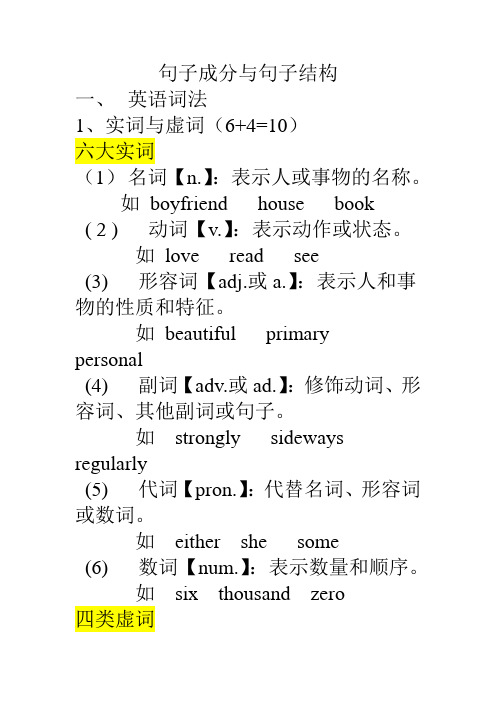
句子成分与句子结构一、英语词法1、实词与虚词(6+4=10)六大实词(1)名词【n.】:表示人或事物的名称。
如boyfriend house book( 2 ) 动词【v.】:表示动作或状态。
如love read see(3) 形容词【adj.或a.】:表示人和事物的性质和特征。
如beautiful primarypersonal(4) 副词【adv.或ad.】:修饰动词、形容词、其他副词或句子。
如strongly sideways regularly(5) 代词【pron.】:代替名词、形容词或数词。
如either she some(6) 数词【num.】:表示数量和顺序。
如six thousand zero四类虚词(7) 冠词【art.】用在名词前,表示名词的特指和泛指。
只有三个:a an the(8)介词【prep.】表示名词、代词和句中其他词的关系。
如regarding with through (9) 连词【conj.】连接词、短语、从句和句子。
如and though but(10) 感叹词【interj.】表示喜、怒、哀、乐等的情感。
如hush oh二、句子成分1、八种:主语(subject)、谓语(predicate)、宾语(object)、表语(predicative)、定语(attributive)、状语(adverbial)、补语(complement)、同位语(appositive)。
2、Say:(1)I saw your brother yesterday.(2) David is reading now.(3) You are not my cup of tea.(4) The boy playing basketball is my son.(5) All students found the exam easy.(6) She will go home to see her poor father.3、【主语】:主语说明谓语动作或状态的执行者,也就是说它表明这句话说的是谁和什么,主语主要由名词、代词、数词或相当于名词的单词,短语或从句充当。
英语句子成分及结构

英语句子成分及句子结构英语句子基本构成成分:主语:可以作主语的成分有名词(如boy),主格代词(如I ,we, he, she, they ),数词、,等。
最常用的便是名词、代词、动名词、动词不定式。
主语一般在句首。
(1)名词作主语English is very important. 英语是很重要的。
The students all love their English teacher. ‘这些学生都爱他们的英语老师。
(2)代词作主语They go to school by bus. 他们乘公共汽车上学。
(3)作主语Watching TV too much is bad for your eyes.看电视太多对你的眼睛是有害的。
It’s no use regretting it. 后悔是无用的。
(4)动词(短语)作主语To see is to believe. 眼见为实。
It is necessary to master a foreign language.掌握一门外语是很必要的谓语:谓语由动词构成,谓语、语态的变化都体现在动词的变化上,一般在主语之后。
(1)作谓语We should help each other. 我们应该互相帮助。
All of the students like the novel. 所有这些学生都喜欢这本小说。
(2)作谓语You’re driving too fast. 你开车开得太快了。
The teacher came in, book in hand. 老师走进教室,手里拿着书。
(3)连系动词作谓语He looks worried.他看起来很担心。
The box itself is not so heavy. 箱子本身并不重。
(4) 复合谓语:①由情态动词加动词原形构成。
如:You may keep the book for two weeks.②由助动词加动词原形,现在分词,过去分词构成。
英语句子成分和英语句子结构讲解
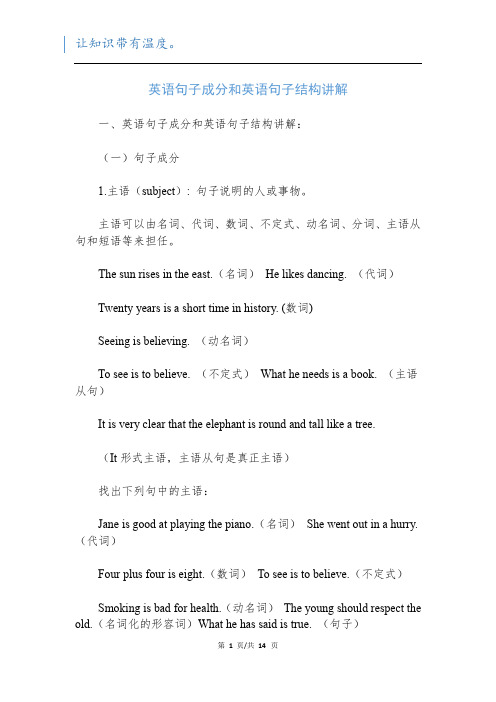
英语句子成分和英语句子结构讲解一、英语句子成分和英语句子结构讲解:(一)句子成分1.主语(subject): 句子说明的人或事物。
主语可以由名词、代词、数词、不定式、动名词、分词、主语从句和短语等来担任。
The sun rises in the east.(名词)He likes dancing. (代词)Twenty years is a short time in history. (数词)Seeing is believing. (动名词)To see is to believe. (不定式)What he needs is a book. (主语从句)It is very clear that the elephant is round and tall like a tree.(It形式主语,主语从句是真正主语)找出下列句中的主语:Jane is good at playing the piano.(名词)She went out in a hurry.(代词)Four plus four is eight.(数词)To see is to believe.(不定式)Smoking is bad for health.(动名词)The young should respect the old.(名词化的形容词)What he has said is true. (句子)2.谓语(predicate): 说明主语的动作、状态和特征。
容易谓语:由动词或动词词组组成I saw the flag on the top of the hill?He looked after two orphans.复合谓语:由情态动词或助动词+动词;He can speak English well.She doesn’t seem to like dancing.找出下列句中的谓语(注:惟独动词才可作谓语。
):1. We love China.2. We have finished reading this book.3. He can speak English.4. She seems tired.3.表语(predicative): 系动词之后的成分,表示主语的性质、状态和特征。
英语句子成分和英语句子结构讲解

英语句子成分和英语句子结构讲解1.主语:句子中承受动作或说明句子中主要内容的成分,通常回答“谁?”的问题。
例如:- My sister (我的妹妹) is a teacher.2.谓语:句子中说明主语动作或状态的成分,通常由动词构成。
例如:- She (她) is reading (在读书) a book.3.宾语:句子中说明动作的承受者或受影响的事物的成分,通常回答“什么?”的问题。
例如:- He (他) likes (喜欢) apples (苹果).4.定语:句子中用来修饰名词或代词的成分,通常由形容词、限定词或被动分词构成。
例如:- The red (红色的) car (汽车) is mine.5.状语:句子中用来修饰动词、形容词或副词的成分,通常回答“怎样?”“在哪里?”“为什么?”等问题。
例如:- She (她) sings (唱歌) beautifully (优美地).6.补语:句子中用来补充说明主语或宾语的成分,常常是形容词、名词、副词、介词短语等。
例如:- He (他) is a doctor (医生).英语句子结构指的是英语句子中各个成分之间的组织方式和顺序。
常见的英语句子结构有简单句、复合句和并列句等。
1.简单句:由一个主语和一个谓语组成,可以有宾语、定语、状语或补语等修饰。
例如:- My cat (我的猫) is sleeping (在睡觉).2.复合句:由一个主句和一个或多个从句组成,从句可以充当主语、宾语、定语或状语等。
例如:- I will go shopping (我将去购物) when I finish work (我完成工作).3.并列句:由两个或多个主句组成,它们之间通常用逗号、分号或连词连接。
例如:- I like coffee (我喜欢咖啡), but my friend prefers tea (但是我的朋友更喜欢茶).。
- 1、下载文档前请自行甄别文档内容的完整性,平台不提供额外的编辑、内容补充、找答案等附加服务。
- 2、"仅部分预览"的文档,不可在线预览部分如存在完整性等问题,可反馈申请退款(可完整预览的文档不适用该条件!)。
- 3、如文档侵犯您的权益,请联系客服反馈,我们会尽快为您处理(人工客服工作时间:9:00-18:30)。
英语句子成分和英语句子结构讲解及练习 主语(subject ):句子说明的人或事物。
The sun rises in the east. (名词) Tvventy years is a short time in history.(数词) To see is to believe ・(不定式)It is very clear that the elephant is round and tall like a tree. (It 形式主语,主语从句是真正主 语)谓语(predicate ):说明主语的动作、状态和特征。
表语(predicative ):系动词之后的成分,表示主语的性质、状态和特征。
Seventy-four! You don' t look it.(代词)Five and five is ten.(数词) He is asleep.(形容词) His father is in. (副词) The picture is on the wall.(介词短语)My v/atch is gone / missing / lost. (形容词化的分词) To v/ear a flower is to say " I' m poor, I can' t buy a ring.(不;卫式)The question is v/hether they vnll come.(表语从句)常见的系动词有:be, sound (听起来),look (看起来),feel (摸起来,smell (闻起来),taste (尝、吃起来), remain (保持,仍是),feel (感觉)・・・宾语:1) 动作的承受者动宾I like China.(名词) He hates you.(代词) How many do you need? We need two ・(数词)We should help the old and the poor. I enjoy working with you. (动需词)I hope to see you again.(不立式) Did you write dov/n v/hat he said?(宾语从句) 2) 介词后的名词、代词和动名词…介宾 Are you afraid of the snake? Under the snow, there are many rocks ・ 3) 双宾语…-间宾(指人)和直宾(指物)He gave me a book yesterday.Give the poor man some money.宾补:对宾语的补充,全称为宾语补足语。
We elected him monitor. (名词) We all think it a pity that she didn' t come here.(名) We will make them happy.(形容词)We found nobody in.(副词)We study English.He is asleep.He likes dancing. Seeing is believing ・ What he needs is a book.(代词) (动名词) (主语从He is a teacher.(名词)It sou nds a good idea ・ Her voice sounds sweet ・ The food smells delicious. The door remains open.The sou nd sounds stra nge. Tbm looks thin. The food tastes good ・ Nov/1 feel tired.Please make yourself at home.介词短语)Don' t let him do that.(省to 不定式)His father advised him to teach the lazy boy a lesson.(带to 不定式)Don* t keep the lights burning・(现在分词)K U have my bike repaired.(过去分词)主补:对主语的补充。
He vzaselected monitor.She v/as found singing in the next room.He vzas advised to teach the lazy boy a lesson ・・ rr365・ 定语:修饰或限制名词或代词的词、词组或句子。
Ai Yarding is a chemistry teacher.(名词) He is our friend.(代词)We belong to the third v/orld ・(数词) He v/as advised to teach the lazy boy a lesson.(形 容词)The man over there is my old friend.(畐ij 词) The v/oman v/ith a baby in her arms is my sister.(介 词) The boys playing football are in Class 2・(现在分词)The trees planted last year are grov/ing well nov/.(过去分词)I have an idea to do it v/elL(不左式)You should do everything that I do.(农语从句)状语:用来修饰V., adj., adv., or 句子。
表示时间、地点、原因、目的、结果、程度、条件、方式和让步。
(以下例句按上述顺序排列)I will go there tomorrov/. meetingroom ・The meat went bad because of the hot v/eather. He didn't study hard so that he failed in the exam. If you study hard, you will pass the exam.Though he is young, he can do it well.句子结构简单句的五个基本句型 主语 + 不及物动词 She came. / My head aches.主语+及物动词+宾语 She likes English. 主语+系动词+表语She is happy.主语+双宾动词+间接宾语+直接宾语She gave John a book ・ She bought a book for me.主语+宾补动词 + 宾语 + 宾语补语She nlakes her mother angry ・The teacher asked me to read the passage ・ (There +be There lies a book on the desk ・ )Exercises分析下列句子成分1 ・ Our school is not far from my home. 2. It is a great pleasure to talk with you 3. All of us considered him honest. shoes ・The meeting will be held in the He studies hard to learn English well. I like some of you very much ・ He goes to school by bike ・4. My grandfather bought me a pair of sports6. He made 让 clear that he v/ould leave the city.9. They pushed the door open.10. Grandma told me an interesting story last night.・ He v/rote carefully some letters to his friends.12. V/e need a place twice larger than this one.15. Don't get nervous .help yourself to what you like ・ 16. We will make our school more beautiful. 17. He didn't come ・ That is v/hy he didn't know. 18. She showed us her many of her pictures. 19. The old man lives a lonely life ・20. Luckily the 1989 earthquake did not happen in the center of tov/n ・ 21 ・ The cars made in Japan are better than those in Germany.22. There are so many people in the hall that it's hard for me to find him. 23. No matter how difficult the task may be, we must fulfil it this month. 24. Go back where you came from ・ 25. We must do whatever the people want us todo.28 Mary handed her homev/ork to the teacher. 29. Do you know the latest news about him?30. I'll get my hair cut tomorrow.翻译练习:3那天早上我们谈了很多。
4会议将持续两个小时。
5在过去的十年里,我的家乡已经发生了巨大的变化。
6这种事情全世界各地每天都在发生。
7 1919年,在北京爆发了 “五•四”运动。
主谓结构(主语+不及物动词)1你应当努力学习。
2她昨天回家很晚。
5. He broke a piece of glass. 7.-I love you more than her, child ・& Tees turn green v/hen spring comes. 14. He asked us to sing an English song.26. At last he got home, tired and hungry.27. V/ould you please pass me the cup?8每天八时开始上课。
